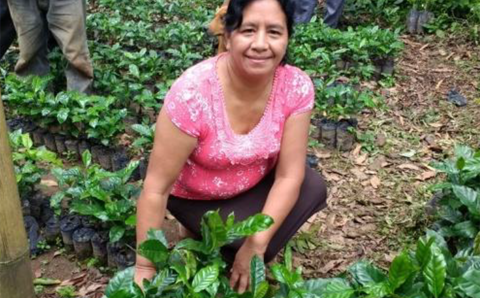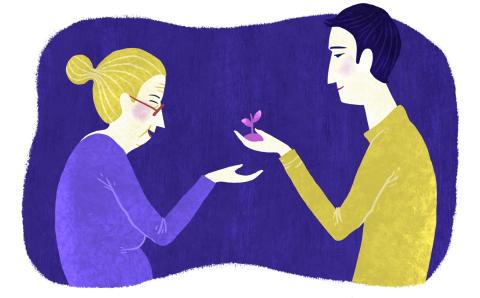One Sunday morning Beth Fellinger finished her sermon by asking everyone in the former restaurant/bar—now serving as a church—to stand and hold hands.
Fellinger is the pastor at Destination Church in St. Thomas, Ont., a congregation that has been intentional about including everyone from their community, regardless of their struggles and perceived abilities.
Fellinger had been preaching from Matthew 12:46-50. In this passage, Jesus was teaching people inside a house when a man told him his mother and brothers were outside and wanted to see him.
Pointing to his disciples, Jesus said, “Here are my mother and my brothers. For whoever does the will of my Father in heaven is my brother and sister and mother.”
As people of God, Fellinger said, the people worshiping at Destination had all joined a new family whose significance goes beyond blood relationships. As a family, she added, our job is to do the will of the Father. “We are to take stock of whatever gifts we have and ask if we are using them to build the body together. We are to pray with one another, to lift one another up.”
Destination Church is one of several congregations across the Christian Reformed Church that live out this all-inclusive sense of family. Such inclusion is a crucial part of Christ’s message, said Mark Stephenson, co-director of Disability Concerns, a joint ministry of the CRC and the Reformed Church in America.
“Jesus’ first recorded sermon proclaimed that God’s kingdom was at hand. Then he spent the rest of his public ministry on earth bringing in the kingdom,” said Stephenson.
“Our calling as disability advocates is to carry on Jesus’ work so that all people, especially people with disabilities, will be welcomed to the body of Christ and encouraged to use their gifts in ministry,” he said.
Destination strives to do just that. It is located in St. Thomas, a community of about 38,000 people that was hard hit during the 2008 recession when two automobile plants closed.
It is also a city with a significant number of people who are connected in one way or another to the provincial mental health system. A large psychiatric hospital was located here for many years. Although that hospital has now closed, a forensic care facility has been opened.
“Generations of people came from all over Ontario to the hospital. When they were released, their doctors and various programs were here, and they never went home,” said Fellinger.
When the government shut down the hospital, some of the patients ended up homeless and others in group homes. Similarly, a number of people released from the forensic hospital stay in town.
Not everyone who attends the church is dealing with a disability. And yet everyone is helped in their walk of faith.
“We have a real mixture of people who come here,” said Fellinger. “By being where we are, we have an opportunity to engage with them. We see that God is really working here.”
The people who come to Destination Church stand, hold hands, and worship as God’s family on Sunday mornings. They use the church as a drop-in center, sitting at tables and sipping coffee during the week. They stop by on Thursday nights for Stone Soup dinner, a meal in which people donate food that is included in the soup.They also work in the community garden, serve as greeters, and go through leadership training classes.
Who are these people and how do they serve? Here are a few of them:
Sam’s* parents both died during a six-week period in 2016.
When he started attending Destination, Sam was very passive, perhaps because he has an intellectual disability and had never been welcomed to serve at previous churches he attended.
“Then Destination started asking him to do simple things, like getting a coffee for someone else,” said Fellinger. As he handled these responsibilities, they asked him to do more.
“Sam is part of hospitality team and volunteers on a daily basis. He reads Scripture in services, helps in Sunday school, does drama with drama team,” said Fellinger.
Sam is a good example of how Destination seeks to enfold people into the fellowship.
When someone comes to Destination, said Fellinger, the church makes no pre-judgments about what a person can or cannot do. They do not look first at their disabilities or other challenges but instead focus on how each person is gifted.
“We work to discover where people’s gifts are, and have a conversation with them about what they believe their gifts are, and give them the opportunity to try,” she said.
Rebecca Anderson got connected to Destination about seven years ago, not long after the church was begun with the support of Resonate Global Mission. She learned of Destination through a friend and showed up.
“I instantly felt comfortable,” she recalled. One memory especially stuck with her.
“When I first attended, my children were young and were not always willing to sit quietly. I remember one of the members smiled at me and my children and told me to take a breath—they are children—and I did and relaxed and was really able to take in the service.”
Destination, she said, has helped her grow as a Christian. “One of the most important things that Destination has helped me with is actually being more comfortable praying with others.
“I always worried that I would not say the right thing or not sound as lyrical as others, but by allowing myself to be vulnerable to others I have learned I am not the only one who has this fear. Now I am happy to say what is in my heart because I know the words will come. A church is not a building—we are the church.”
Eva Kuhn, who struggles with depression, was sitting at a table one afternoon in the drop-in center with her young adult son. They come in often, just to be together and to talk with others.
Before becoming a part of Destination, Kuhn had tried different denominations, including a Catholic and a Baptist church. “But from the first day I came in here, I fell in love and thought this is where I have needed to be all of my life.”
Fellinger’s smile and upbeat personality were “like a ray of sunshine,” said Kuhn.
“Something clicked, and so I kept coming here. . . . To help out, I hand out bulletins on Sunday morning. I help in the kitchen and clean up.”
Her faith in God has been renewed at Destination Church, she said. “I feel like I’ve grown. I used to be afraid just going down the street, and now I don’t feel afraid anymore. Something has been lifted.”
After spending only a few months at Destination, David and Cindy Feddema began to see its resemblance to the early Christian churches described in the Book of Acts: churches that shared their lives and worldly goods; churches that followed the leading of the Spirit.
At the heart of Destination, said David, who has been attending the church since 2013, is the desire be a community that sees the face of Christ in everyone. They are a family with room for anyone who is seeking faith and the love of others.
“As a church, we actively share the good news of the gospel with those willing to listen,” he said. “We welcome everyone to come as they are and try to add value to each person’s life.”
“We are connecting with others and helping them connect to God. This intentionality has stretched and strengthened my faith and walk with God. It can be challenging, but it is very rewarding to serve God this way,” he added.
Above all, he is grateful to see how the love they share in their church family has been moving out and touching the wider community.
“My prayer is that we are having an impact on the community of St Thomas,” he said. “We have tried to build relationships between our church and numerous social agencies within the city. I think it’s just the beginning and these connections will expand beyond our imagination.”
*Name changed.
Making Progress in Disability Concerns
More than 40 years ago, the Christian Reformed Church in North America began to seriously consider how it could best minister to people with disabilities.
“Seminal conversations at that time resulted in the birth of both Disability Concerns and Friendship Ministries,” said Mark Stephenson, co-director of Disability Concerns.
Friendship Ministries began as a ministry of the CRCNA to support faith formation and congregational inclusion of individuals with intellectual disabilities. Today it is a stand-alone ministry that serves churches and organizations around the world.
Disability Concerns is a ministry that strives to help congregations become places where everybody belongs and everybody serves.
Since 1997, it has surveyed Christian Reformed congregations regarding their building, communication, and ministry accessibility.
“These surveys show clear progress in accessibility of facilities for people with mobility impairments,” said Stephenson.
Fifteen years ago, for example, fewer than half of CRC church facilities had accessible main entrances, restrooms, or worship, fellowship, and classroom areas. Now, nearly 90 percent of churches have made these areas of their buildings accessible.
“Pulpit areas remain the least accessible parts of buildings, with only about one-third of churches having accessibility in that area,” he added.
Stephenson said that over one-third of congregations now have a disability policy, and accessible communications (barrier-free print and sound) have also shown modest improvement over the years.
“In talking with congregations, my sense is that many more congregations are thinking about accessibility issues—and not just building accessibility—than when I started this work 12 years ago,” he said.
At the same time, Stephenson also noted that there continues to be a need for education, advocacy, and action surrounding those with disabilities as part of congregational life.
“Surprisingly, we have seen a significant decline in the number of reported professions of faith of people who have disabilities from a high of 310 in 2006 to none in 2015,” he said, as an example. “We've made good progress, and we still have a long ways to go.”
About the Author
Chris Meehan is a freelance writer and commissioned pastor at Coit Community Church in Grand Rapids, Mich.







